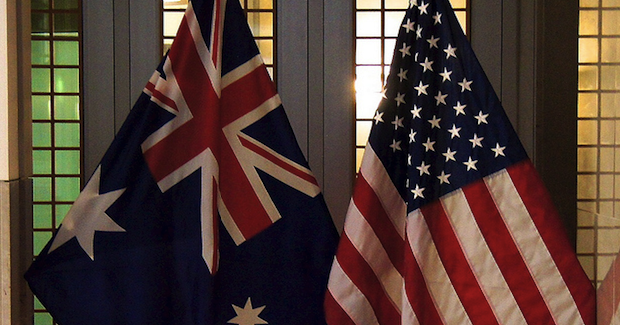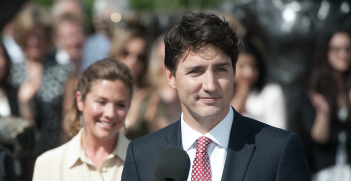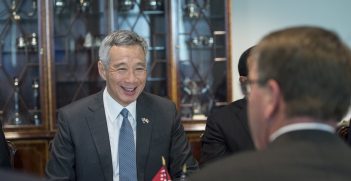The Trump Effect and Australia

Every change of administration in Washington produces a reset in American foreign policy. Depending on whether the new president is from the same or the opposing party, the reset tends to be modest or substantial. Yet the election of Donald Trump has unsettled many foreign governments—something made clear this week in his dealings with Taiwan.
Trump will be the first US president to have had no previous government or military leadership experience and his previous statements have challenged the settled consensus on a range of foreign policy issues. Few believe it will be business as usual in Washington from January.
The resulting uncertainty about the Trump administration’s foreign policy directions, with the accompanying risks of unpredictability and volatility, confronts allies with choices of unprecedented urgency. Governments are already positioning themselves in anticipation of the president-elect’s likely lines of engagement with international affairs, a phenomenon that has been dubbed the Trump Effect by the New York Times’ Peter Baker among others: “Around the world, his election is already shaping events…governments are recalibrating policies on trade, defence and immigration.”
Trump could prove disruptive by forcing many allies, including Australia, to engage in a clear-eyed and hard-headed analysis of the costs, risks and constraints of the US alliance alongside its security, diplomatic and economic benefits.
There is considerable scepticism about Trump’s commitment to uphold the post-1945 liberal international order crafted under American leadership and underwritten by US military power, economic heft and geopolitical clout. His pre-election statements on trade, immigration, alliances and nuclear policy in particular seemed to question these four critical pillars of established US policy under Democratic and Republican administrations alike, if with differences in emphases and style.
One way or another, therefore, world order is at an inflection point. While some are busy lamenting “The End of the Anglo–American Order“, others are engaged in efforts to discern the outlines of Trump’s new world order. Clearly, history does irony: the person set to become president with the least previous foreign policy interest and experience could end his term with the most consequential impact on global affairs.
The more things change
Operating in a world as it actually is means acknowledging that all great powers act and react like great powers. The US may lose aspects of its primacy but will remain unrivalled in almost all the attributes that make a great power and will act accordingly all over the world. If, or while, Russia recovers the trappings of a great power, it will return to acting like one to defend its vital interests in and near its neighbourhood. Meanwhile China continues to advance rapidly to the status of a major power in the Indo-Pacific with a growing global footprint.
Although under Trump US relations with Russia could normalise, the risk of falling victim to the Thucydides Trap—whereby only four of the 16 power transitions in the last 500 years were peaceful—could increase in the Asia-Pacific as China and the US elbow each other to assert primacy in the region’s crowded strategic space.
The Trump rebalance of the central tenets of US foreign policy effectively ends the short-lived pivot to Asia, even though like most incoming presidents, Trump is unlikely to implement all his ideas developed on the run during the election season. China will step into the leadership vacuum as the stabilising power in the Asia-Pacific and—in another historical irony—as the custodian of the global commons in efforts to check the pace and impacts of climate change.
Australia’s role
Whether or not Trump succeeds in draining the swamp in Washington, he does seem determined to drain the swamp of war. The swath of ungoverned territories from Afghanistan through the Middle East to North Africa is graphic evidence of the failure of the US military to defeat rag-tag armies of insurgents, pacify populations and stabilise countries. Instead, as the US disengages from these multiple continuous wars it will leave behind a confetti of broken and dysfunctional countries once ruled by brutal but stable and—at least in Iraq, Libya and Syria—secular dictators.
While realism requires us to deal with the world as it is, ideals impel us to edge towards the world we would like to live in. As Minister for Foreign Affairs Julie Bishop has repeatedly affirmed, Australia is a “Top 20” nation. As such, it is not inconsequential and does have the ability to shape regional security and global normative architectures to ensure our interests and values converge as much as possible.
Australia faces a further dilemma, between a rules-based order on the one hand and tribal solidarity with the white Anglosphere on the other. The latter would be a rational strategic choice were American primacy and supremacy to continue for decades. The former is a better pursuit of Australian interests and values if the judgment is made that US primacy is not indefinitely sustainable, is indeed facing more intense challenges with every passing year, and therefore Washington will have to cede primacy and share strategic space with China in particular in the Asia-Pacific region.
Future defence
In turn this calls into question the assumption that the US will indefinitely retain the ability and will to defend Australia. The alliance has given much of value to Australia: access in Washington, military equipment and training, intelligence, nuclear deterrence and bases in Australia. However, these are not cost-free. Hosting critical nuclear infrastructure facilities means hosting likely targets of a nuclear strike. Like all insurance schemes, the premium has to be paid up front and replenished periodically, but US willingness to pay out when the emergency arises will not be tested until the event.
Of course, the first foreign policy requirement of any government is to look after the nation’s security. But does the balance of security threats, the cost of the premium, the opportunity costs of US priorities distorting Australian policy choices and the expected utility of the security payout when Australia is in peril still lie in continuing with the alliance essentially unchanged?
Without rupturing ANZUS, Australia must reclaim the space to chart an independent foreign policy according to a Canberra-based calculation of national values and interests. Indeed, a visibly independent foreign policy on matters important to Australia could be the most effective strategy for quarantining the alliance from the disruptive Trump effect.
Ramesh Thakur, a former UN Assistant Secretary-General, is professor in the Crawford School of Public Policy, Australian National University.
This article is published under a Creative Commons Licence and may be republished with attribution.





